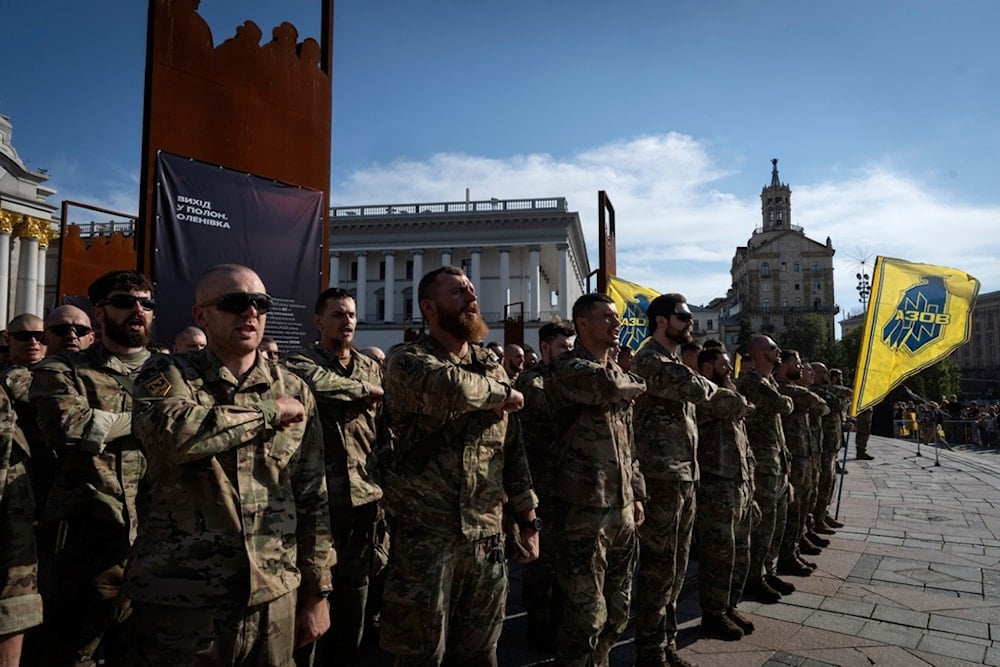Ukraine's infamous Azov Battalion eyes English-speaking recruits
Azov, a volunteer brigade with a decade-long history rooted in nationalist origins, is planning to establish an "international battalion" to strengthen its ranks.
-

Soldiers of Ukraine's Azov battalion pray at a rally demanding to free Ukrainian prisoners of war who are held in captivity in Russia, at Independence Square in Kiev, Ukraine, Sunday, July 28, 2024 (AP)
Ukraine’s most prominent combat unit is actively seeking English-speaking recruits as Kiev faces mounting battlefield challenges, The Guardian reported on Friday.
Azov, a volunteer brigade with a decade-long history rooted in nationalist origins, is planning to establish what it dubs an international battalion to strengthen its ranks as Ukraine approaches its fourth year of full-scale war with Russia, the news website said.
The unit's commander, known by the call sign Karl, emphasized their focus on recruiting individuals with military experience “because Ukraine is smaller than Russia” and needs all the assistance it can get "in a struggle of international significance."
He further claimed that “we are fighting to not let Russia become closer to Europe,” adding that a Ukrainian defeat could embolden Moscow to threaten Poland, the Baltic states, and other nations.
The Guardian noted that since the start of Ukraine's war with Russia, 15 Britons have been killed while serving as soldiers or volunteers, including two whose deaths were recently announced. These include Jordan Maclachlan, a 26-year-old frontline medic from Scotland, and Jake Waddington, a 34-year-old former British Army soldier and member of the International Legion.
A flow of Britons and other Western nationals has joined Ukraine’s armed forces over nearly three years of conflict, which by early December had killed 43,000 Ukrainian soldiers.
While traveling to Ukraine to join its armed forces is not illegal for British citizens, unless they are active UK military personnel, it is not officially encouraged, the report mentioned.
Former UK Defence Secretary Ben Wallace previously pointed out that Britons without military training would offer limited value to Ukraine’s military.
Non-Ukrainians seeking to join Azov must undergo a rigorous recruitment process, including interviews in Kiev, psychological evaluations, and polygraph tests to rule out potential infiltration by Russian special forces, according to Karl.
Initial training spans two to three months, even for experienced recruits, with groups of around 80 people. The training is designed to reflect the realities of Ukraine’s battlefield, which relies heavily on drones and artillery.
Karl indicated that "the training of some soldiers in Europe hasn’t changed much since the second world war."
After training, those who choose to stay are integrated into infantry assault units, with Karl acknowledging the inherent dangers of such roles.
According to The Guardian, Azov currently operates near Toretsk in eastern Ukraine, a war-torn town divided between Ukrainian and Russian forces.
The news website suggested that the overall situation on the front lines is expected to deteriorate, as Donald Trump’s presidency could lead to a reduction or cessation of US military aid in pursuit of ending the conflict.
Azov originated in 2014 as a volunteer militia combating pro-Russian forces. Some of its early leaders espoused ultra-nationalistic and far-right ideologies, leading Russia to label it a terrorist organization in 2022.
For years, the US also refrained from directly supplying arms to the group. But in the summer of 2022, a US review lifted the arms ban after concluding that Azov had not committed any human rights violations. Russia, in response, accused Washington of being willing to "flirt with neo-Nazis," claims that Azov members dismiss as propaganda.

 3 Min Read
3 Min Read









